Advertisements
Advertisements
state and prove varigon’s theorem.
Concept: Varignon’s Theorem
Find the resultant of the force system as shown in the given figure.
Concept: Resultant of concurrent forces
Find the resultant of the force acting on the bell crank lever shown. Also locate its position with respect to hinge B.
Given : Forces on the bell crank lever
To find : Resultant and it’s position w.r.t hinge B
Concept: Resultant of parallel forces
In the rocket arm shown in the figure the moment of ‘F’ about ‘O’ balances that P=250 N.Find F. 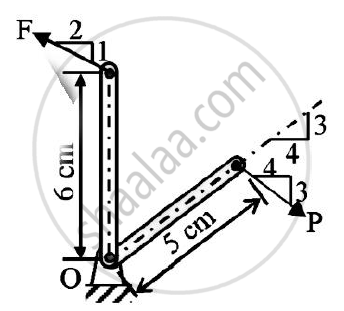
Concept: Resultant of concurrent forces
Find the force F4 , so as to give the resultant of the force as shown in the figure given below.
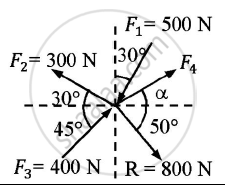
Given : Forces and their resultant
To find : Force F4
Concept: Resultant of concurrent forces
The resultant of the three concurrent space forces at A is 𝑹̅ = (-788𝒋̅) N. Find the magnitude of F1,F2 and F3 forces.

Given : A=(0,12,0)
B=(-9,0,0)
C=(0,0,5)
D=(3,0,-4)
Resultant of forces = (-788𝑗̅) N
To find : Magnitude of forces F1,F2,F3
Concept: Resultant of concurrent forces
A force of 140 kN passes through point C (-6,2,2) and goes to point B (6,6,8). Calculate moment of force about origin.
Concept: Moment of force about a point
A machine part is subjected to forces as shown.Find the resultant of forces in magnitude and in direction.
Also locate the point where resultant cuts the centre line of bar AB.
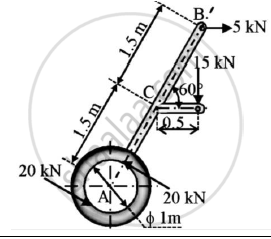
Solution:
Given : A machine subjected to various forces
To find : Resultant of forces
Point where the resultant force cuts the bar AB
Concept: Varignon’s Theorem
Find the resultant of the parallel force system shown in Figure 1 and locate the same with respect to point C.

Concept: Resultant of parallel forces
A force of magnitude of 20kN, acts at point A(3,4,5)m and has its line of action passing through B(5,-3,4)m. Calculate the moment of this force about a line passing through points S(2,-5,3) m and T(-3,4,6)m.
Concept: Moment of force about a point
Determine the position of the centroid of the plane lamina. Shaded portion is removed.
Concept: Centroid for Plane Laminas
Find the centroid of the shaded portion of the plate shown in the figure.
Concept: Centroid for Plane Laminas
For the composite lamina shown in the figure, determine the coordinates of its centroid.
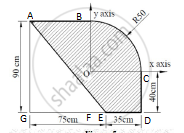
Concept: Centroid for Plane Laminas
Determine the reaction at points of constant 1,2 and 3. Assume smooth surfaces.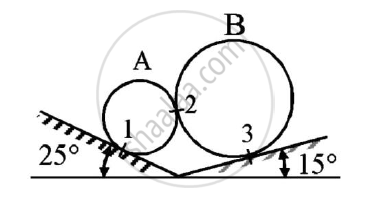
Given: The spheres are in equilibrium
To find: Reactions at points 1,2 and 3
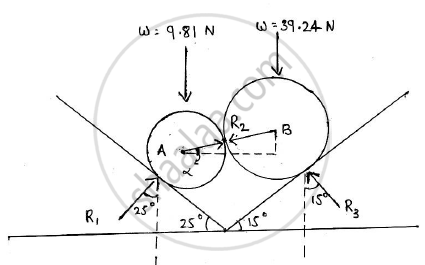
Concept: Condition of Equilibrium for non-concurrent nonparallel general forces
Explain the conditions for equilibrium of forces in space.
Concept: Condition of equilibrium for concurrent forces
Find the support reactions at A and B for the beam loaded as shown in the given figure.
Concept: Condition of equilibrium for parallel forces
Determine the force P required to move the block A of 5000 N weight up the inclined plane, coefficient of friction between all contact surfaces is 0.25. Neglect the weight of the wedge and the wedge angle is 15 degrees.
Given : Weight of block A = 5000 N
μs=0.25
Wedge angle = 15º
To find : Force P required to move block A up the inclined plane
Concept: Condition of equilibrium for concurrent forces
State Lami’s theorem.
State the necessary condition for application of Lami’s theorem.
Concept: Condition of equilibrium for parallel forces
Two spheres A and B of weight 1000N and 750N respectively are kept as shown in the figure..Determine reaction at all contact points 1,2,3 and 4. Radius of A is 400 mm and radius of B is 300 mm
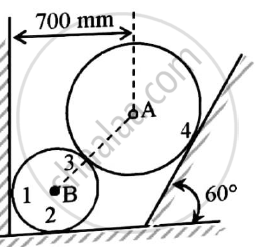
Given : Two spheres are in equilibrium
W1=1000 N
W2=750 N
rA=400 mm
rB=300 mm
To find : Reaction forces at contact points 1,2,3 and 4
Concept: Condition of Equilibrium for non-concurrent nonparallel general forces
Refer to figure.If the co-efficient of friction is 0.60 for all contact surfaces and θ = 30o,what force P applied to the block B acting down and parallel to the incline will start motion and what will be the tension in the cord parallel to inclined plane attached to A.
Take WA=120 N and WB=200 N.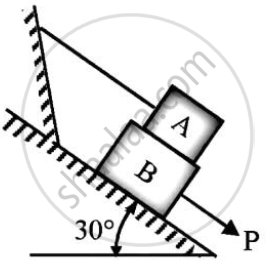
Concept: Condition of equilibrium for concurrent forces
